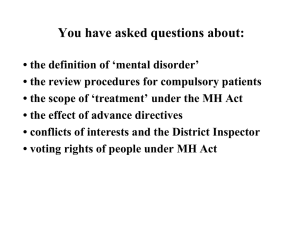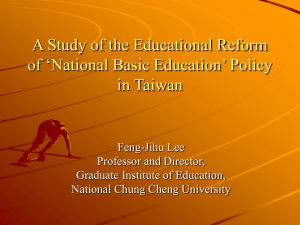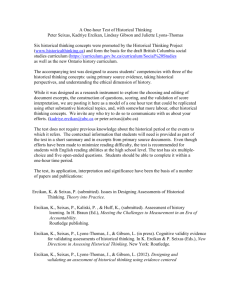17) Telling stories or teaching historical thinking
advertisement
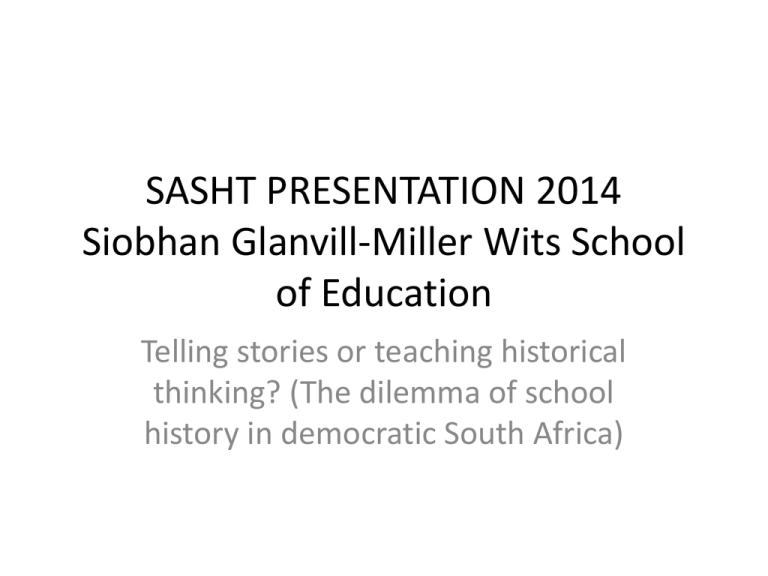
SASHT PRESENTATION 2014 Siobhan Glanvill-Miller Wits School of Education Telling stories or teaching historical thinking? (The dilemma of school history in democratic South Africa) What is school history today? • Influenced by the British Schools Council Project 1972- “Doing history” rather than “telling the story and memorizing the facts.” • Wineburg (1991) “Unnnatural way of thinking”- Sourcing, contextualizing, corroborating and close-reading. • Seixas et al – Canadian Benchmarks of Historical Thinking- “The Big Six” Peter Seixas (2000) : Three Options • The Best Story Approach- “The power of the story to define who we are in the present…Consistent with an authoritarian political culture” • The Disciplinary Approach- “history as a way of knowing…suited to the education of critical citizens in a liberal democracy.” • The Postmodern Approach in school? History and power? Narrativity of history? Historiography a literary act? Positionality of historians and texts? Can we ever really know? Lee and Ashby (2000) • History in school should be a balance of substantive knowledge (content and first order concepts – like revolution, monarchy etc…) and procedural knowledge (the processes of doing history – second order concepts- like sourcing; cause and effect; multiple perspective taking etc…) Why Compulsory History? Political pressure- young people don’t know the story of their land - Australia – “black armband history” vs. “Three Cheers History” = “History Wars” - Britain- Gove 2011 Parliamentary Debate about “ the island story”. - America- American history has always been compulsory but debates about what and who the youth don’t know… - Japan, Nigeria What is school history in South Africa 20 years into democracy? CAPS (2011)- Emphasis back to historical content but states that “History is a process of enquiry” – 8 historical skills emphasize “doing history”. E.g.. “ Evaluate the usefulness of sources, including reliability, stereotyping and subjectivity…Recognize that there is often more than one perspective of a historical event… Engage critically with issues of heritage and public representations of the past…” What is actually happening as experienced by Pre-Service educators? • Comments from Teaching Experience 2014: • You say that our lessons must be learnercentred and that the learners must “do history”- the reality is teaching a body of knowledge using a textbook or a workbook. • I was not even allowed to use different words in my power point… • The learners just fill in missing words or phrases in workbooks… What does this reveal about history teaching? • Teachers’ epistemologies? Backgrounds in the discipline. (copiers, subjectivists,criterialists) • Teachers are concerned about coverage to meet assessment requirements and fitting in with the expectations of institutional classroom management… Even though they know that history is a process of enquiry. • latest matric papers- mainly focus on closereading (getting specific info from the source) a few questions on reliability… Many questions begin with ‘explain’… Why Compulsory History in postapartheid South Africa? • Lindiwe Sisulu(2013) “What defines us as a people is our history…” • SADTU (2014 Draft document) : “ Ultimately the future preservation of our culture and heritage …means teaching history as a compulsory subject to provide a foundation of much needed celebration of our past…History introduces learners to traditions, practices, values and norms of the group… Our history needs to tell a correct story …We understand that those who are against this call are scared of telling the real story …The biggest fear is that no-one can tell the story of South Africa without mentioning the ANC…” President Zuma 03 October 2014 • SADTU Boksburg Conference: “ Our children should know the history of their country…Most importantly our children and the youth, black and white should know that the freedom and democracy they live in today, came through blood, sweat and tears. In this way they will love their country more and be able to participate in building a prosperous democracy where all enjoy the fruits of freedom and democracy.” 2014 Elections “We have a good story to tell.” ANC Narrative What do pre-service educators think? -”If it is compulsory we will all get work!” -“History builds a character in a child…we should learn from each other…we need patriotic youth.” - “We are a rainbow nation…history is a way forward…” -“History has its own unique skills.” -“We should know what makes our nation great.” Pre-Service Educators against compulsory history • “How will we address all the different groups?” • “Not one definition of truth…we should rather not impose one truth. There is still evidence we don’t know.” • “Do we just want African-centred children? Do we really want to be Americans?” • “There will be ‘othering’. Are we preparing our learners to be South Africans or Earthlings?” “Best Story”; “Disciplinary” or “Postmodern?” (Seixas) “If we had an easy consensus on collective memory, a knowledge of the past through tradition, then school history could be mobilized for a coherent social purpose. But, the lack of consensus is precisely what thrusts us beyond school history as consensual tradition, into the realm of history as a disciplinary practice. Disciplinary history provides students with standards for inquiry, investigation, and debate.”(2000. p.34) References • Seixas, P. (2000). “Schweigen! Die Kinder! Or, Does Postmodern History Have a Place in the Schools?” • DBE. RSA.(2011) Curriculum and Assessment Policy Statement. (CAPS).History. • SADTU Draft Document. “The importance of Teaching History as a Compulsory Subject.” • Smillie, S. “History ensures we remember who we are.” The Star. Tuesday December 24 2013.p8 References ctd • http://www.sabreakingnews.co.za/2014/10/0 3/our-children-should-know-the-history-oftheir-country (Downloaded 10/08/2014) • Jerm Cartoon. eNCA.com 14/3/2014

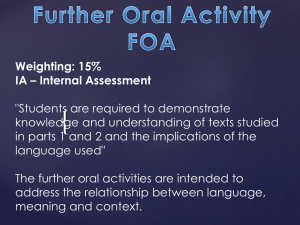
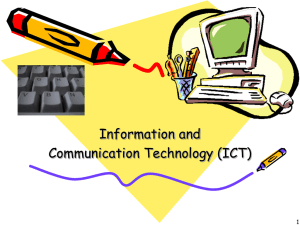
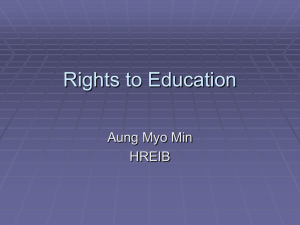
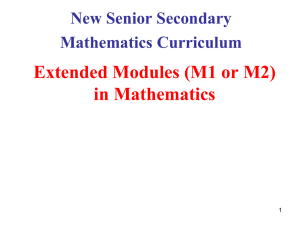
![“The Progress of invention is really a threat [to monarchy]. Whenever](http://s2.studylib.net/store/data/005328855_1-dcf2226918c1b7efad661cb19485529d-300x300.png)



